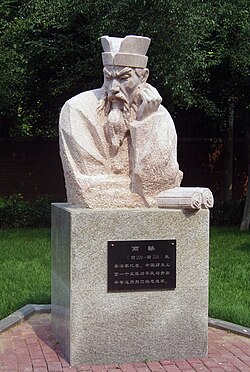
Back شانغ يانغ Arabic شانج يانج ARZ Shang Yang AST Шан Ян Bashkir Шан Ян Byelorussian Shang Yang Catalan شانگ یانگ CKB Šang Jang Czech Shang Yang German Shang Yang Spanish
| Shang Yang | |||||||||||||||||||||||||||||||||
|---|---|---|---|---|---|---|---|---|---|---|---|---|---|---|---|---|---|---|---|---|---|---|---|---|---|---|---|---|---|---|---|---|---|
 Statue of Shang Yang | |||||||||||||||||||||||||||||||||
| Chinese | 商鞅 | ||||||||||||||||||||||||||||||||
| |||||||||||||||||||||||||||||||||
| Part of a series on |
| Chinese legalism |
|---|
 |
Shang Yang (Chinese: 商鞅; c. 390 – 338 BC), also known as Wei Yang (Chinese: 衞鞅) and originally surnamed Gongsun, was a statesman, chancellor and reformer of the State of Qin. Arguably the "most famous and most influential statesman of the Warring States period",[1] Gongsun was born in the Zhou vassal state of Wey,[2] migrating to take up office in the Qin state. His policies laid the administrative, political and economic foundations that would eventually enable Qin to conquer the other six rival states, unifying China into a centralized rule for the first time in history under the Qin dynasty. Scholars consider it likely that both he and his followers contributed to The Book of Lord Shang.[3]
- ^ Pines 2024, p. 24.
- ^ Antonio S. Cua (ed.), 2003, p. 362, Encyclopedia of Chinese Philosophy [1] "The fifth important legalist, Shang Yang (Wei Yang, c. 390–338 B.C.E.), was born in Wei; his original surname was Gongsun."
- ^ Pines, Yuri, "Legalism in Chinese Philosophy", The Stanford Encyclopedia of Philosophy (Winter 2014 Edition), Edward N. Zalta (ed.), 1.1 Major Legalist Texts, http://plato.stanford.edu/archives/win2014/entries/chinese-legalism/
© MMXXIII Rich X Search. We shall prevail. All rights reserved. Rich X Search